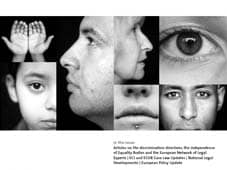Activities protected by human rights legislation include employment, accommodation and facilities, and meeting special needs.
1. Employment
- Everyone has a right to “equal treatment with respect to employment” in the job application process, as well as in training, transfers, promotions, apprenticeship, dismissal, and layoffs.
CONSTRUCTIVE AND DIRECT DISCRIMINATION
Constructive Discrimination – employment policies that inadvertently exclude certain individuals, resulting in discrimination, i.e. in the past, the police have had a mandatory minimum height requirement that effectively discriminated against women and minority groups (this requirement has been struck down by the courts).
Direct Discrimination – an overt act of discrimination, such as refusing service or employment to someone simply because of his or her  membership in a particular group.
membership in a particular group.
DUTY TO ACCOMMODATE
- The Supreme Court of Canada has ruled that an employer has a legal DUTY TO ACCOMMODATE an employee’s individual needs.
- The employer must take reasonable measures to implement policies or working conditions to meet the special needs of the employee. For example, if the employee is unable to work on a specific day because of his or her religious beliefs, the employer must try to resolve the conflict in a way that satisfies both parties.
- Though the employer has a duty to accommodate, they are not expected to suffer UNDUE HARDSHIP – the result of a change that would affect the economic viability of an enterprise or produce a substantial health and safety risk that outweighs the benefit of the accommodation. In cases where this occurs, the employer has the burden of proving that accommodating the employee would cause undue hardship for the business.
HARASSMENT IN THE WORKPLACE
Harassment – persistent behaviour that violates the human rights of the victim. Can include racial, sexual or religious slurs if repeated or ongoing.
Sexual Harassment – unwelcome sexual contact, remarks, leering, demands for dates, requests for sexual favours, and displays of sexually offensive pictures or graffiti.
- Employers are responsible for ensuring that the conduct of their employees does not constitute harassment.
POISONED ENVIRONMENT
- An uncomfortable or disturbing atmosphere created by the negative comments or behaviour of others.
- Can occur when comments or actions create real or perceived inequality – a person only has to feel uncomfortable for the environment to be considered poisoned;
- It is the employer’s responsibility to ensure a poisoned environment does not exist in the workplace.
LEGAL EXCEPTIONS
The following actions are not considered discriminatory as they are considered “reasonable and justifiable” under the circumstances:
a) BONA FIDE OCCUPATIONAL (JOB) REQUIREMENT – a qualification that would normally be considered discriminatory but is necessary for proper or efficient job performance, or safety. For example, the requirement that you need perfect vision to become a pilot. If you are blind, you cannot apply for the job, however many would agree that they wouldn’t want someone who is blind to fly a plane.
b) AFFIRMATIVE ACTION – giving advantages to groups who have been discriminated against in the past. For example, a female candidate might be chosen over a male candidate for the position of security guard at a women’s shelter, even though his work experience might be more extensive than hers.
2. Accommodation and Facilities
- ACCOMMODATION refers to the place where people live or want to live;
- May be long term or temporary (i.e. a hotel);
- All people have the right to equal treatment in accommodation, protected by provincial human rights codes;
- Includes the right to be free from discrimination based on age, marital status, or source of income;
- FACILITIES refer to areas or buildings designated for public use, such as parks, concert halls, movie theatres, or hockey rinks.
- Discrimination on the basis of disability is prohibited by most provincial human rights codes;
- Employers are required to accommodate the needs of workers with psychological, emotional, or physical disabilities;
- Addiction to drugs or alcohol is also likely to be considered a disability protected under human rights legislation.
- In Ontario, buildings, programs, procedures, and services must be designed to include all people equally and fully.
- Where it is impossible to remove barriers without undue hardship, special arrangements must be made so that persons with disabilities can participate.
- Any limits to the duty to accommodate fall under the category or undue hardship.
- To prove undue hardship, three factors are considered:
3. Meeting Special Needs
- i. Cost
- ii. Outside sources of funding
- iii. Health and safety
Depending on the nature of the job or activity and the extent of the disability, an employer, landlord, or service provider may be able to plead undue hardship.
4. Goods and Services
- Under human rights legislation, everyone has a right to equal access to goods and services.
- GOODS – refers to merchandise that can be purchased; SERVICES provide ways of meeting consumer needs that do not involve the purchase of tangible goods, such as banking, dry cleaning, taking a bus, etc.

1 Comment